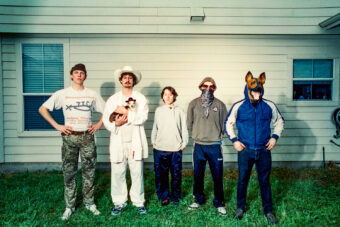Release Date: August 26, 2015
Label: Tender Loving Empire
Since the release of 2013’s Nobody Knows., his last LP for XL subsidiary Hot Charity, Willis Earl Beal‘s been through some s–t. The vagabond songwriter publicly and dramatically left the label, then ditched his New York City home, moved to Washington state, watched his marriage dissolve, moved to Portland, and became briefly homeless. You’d be forgiven if, as a result, you expect more tumult and torture on Noctunes, his latest in a hazy run of home-recordings. Over the years, his best work has come in moments of sublimation. He’s penned down-on-his-luck ballads and used rotten life circumstances as fuel for (literally!) stomping, scratchy folk come-ons whose bravado stops just a few notches shy of Kendrick Lamar’s Eiffel Tower simile.
Not so this time around. Beal’s mode here is anhedonia, as if the overstimulation of the last few years is finally enough, and he’d rather just retreat into syrupy synthesizers and feel absolutely nothing. It’s strange to see him glaze over on songs like “Survive” where he once would have stood in defiance. It’s a song of surrender to something bigger than yourself (“Turn your eyes to the sky and remove all doubt / If you want to survive” goes the central plea), but its sonics are far from sacred, his voice quivering and shaking under the weight of the dense keyboard drones. If you’re not careful, the world around you “will eat you alive.” Especially given the boisterous resilience he exhibited in the past, it’s a surprise to see him retreat, but it makes these hushed recordings all the more tender — a depression that provokes compassion, not pity.
He’s come to these existential realizations over the course of his last couple of self-released efforts, like 2014’s similarly staid Experiments in Time, but they hit the hardest here now that he’s finally figured out how to make his frigid keyboards sound bone-chilling. He sets synths loose on “Stay.” like spinning tops, wobbling and weaving with all of the precariousness and none of the whimsy, as if the outcome of the relationship he outlines hangs on this delicate balance, this inevitable collapse. He’s asking a lover to stay, knowing that they’re just going to go anyway.
That sense of resignation threatens to render Noctunes a laborious listen, but moments of lightness give the record a little bit of balance. Sprightly sighs and ether-bound synth pads keeps “Flying So Low” from crashing, but the danger that it could is what makes all of these songs work so well. Beal has said that he’s “only ever wanted to make lullabies,” but after all that he’s been through, these spaced-out recordings are coming out a little weirder and a little darker and a little more affecting than such a descriptor would suggest. These are more like funeral dirges, but it’s easy to see how he’d make that mistake. Sleep is the cousin of Death, after all.





